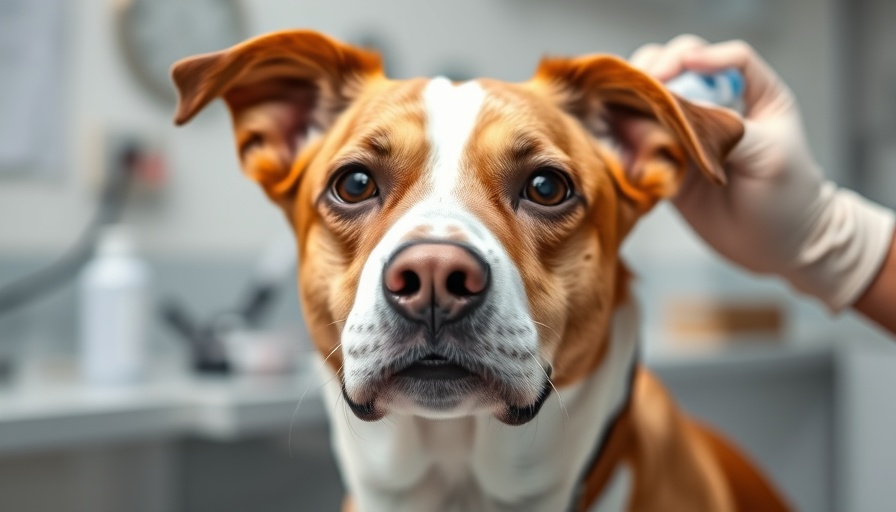
Understanding Hemorrhagic Gastroenteritis: A Silent Threat
As dog owners, the connection we share with our furry companions is profound—each wag of the tail, each gentle nuzzle, reminds us that they are part of our family. But as much joy as they bring, they can also suffer from conditions that strike suddenly and without warning. One such serious medical issue is Hemorrhagic Gastroenteritis (HGE), now often referred to as Acute Hemorrhagic Diarrhea Syndrome (AHDS). This inflammation of the stomach and intestines is accompanied by alarming symptoms such as vomiting and bloody diarrhea. Understanding this condition could save your dog’s life.
Identifying the Symptoms: The Key to Quick Recovery
It’s essential for dog owners to be vigilant. HGE can escalate quickly from minor symptoms to a critical situation. Typically, a dog may suddenly start experiencing:
Profuse, bloody diarrhea that resembles raspberry jam
Repeated vomiting
Weakness or lethargy
The rapidity of symptom development can be alarming. Your dog may seem perfectly healthy one moment, only to be in distress just a few hours later. Recognizing these early warning signs can make all the difference.
Who Is at Risk? The Breeds That Suffer the Most
While HGE can affect any dog, small toy breeds such as Yorkshire Terriers and Toy Poodles are disproportionately susceptible, particularly in their mid-life around five years of age. Understanding breed susceptibility can help owners be more proactive in monitoring their pets’ health.
Why Quick Action Is Crucial: The Dangers of HGE
HGE is categorized as a veterinary emergency due to its aggressive nature—swift dehydration, low blood pressure, and shock can occur if left untreated. Dogs can experience drastic changes in health status, often declining within a matter of hours. Immediate veterinary intervention paired with aggressive fluid therapy is critical for survival.
Diagnostic Procedures: What to Expect at the Vet
If you suspect your dog suffers from HGE, you'll need to act quickly. Upon arrival at the veterinary clinic, the vet will assess your dog’s overall condition. They typically conduct blood tests, including checking the packed cell volume (PCV), to rule out critical issues such as parvovirus or internal obstructions. Understanding these diagnostic processes can ease the worry of pet owners and affirm the importance of seeing a veterinarian immediately.
Home Care: Nurturing Your Pup Back to Health
After veterinary treatment, your work doesn’t stop. Transitioning back to home care involves implementing a bland diet, ensuring hydration, and carefully monitoring your dog's recovery. Probiotics can also help restore gut health, bringing a sense of normalcy to your pup’s life once again.
Long-Term Prevention: A Healthier Future for Your Dog
For many pet owners, seeing their dog go through a medical scare is a wake-up call. Regular vet visits and discussions regarding diet, stressors, and environmental factors can help in understanding how to prevent HGE in the future. Avoiding stress and ensuring a balanced diet are crucial steps in keeping your canine companion healthy.
Emotional Impact on Pet Owners: A Human Experience
The emotional turmoil that comes with a pet’s sudden illness can be as overwhelming as the fear itself. Many pet owners feel deep anxiety, concern, and sometimes guilt—wondering if they missed any warning signs. Knowing you're not alone in this tremendous responsibility is reassuring. Sharing stories within the dog-owning community can provide beneficial support.
Conclusion: Act Now for Your Pup’s Well-Being
Your pup’s well-being relies on your awareness and action. Understanding HGE and its symptoms can be life-saving. The love for our pets obligates us to act decisively—if you see any signs of distress, please seek veterinary attention without delay. By staying informed, we can help bridge the gap between potential danger and a swift recovery for our beloved dogs. Remember, your dog’s health is in your hands, and you have the power to create a safe environment for them.
Join our community of dog owners who share valuable insights and tips on keeping pets healthy. Sign up for our newsletter today!
 Add Row
Add Row  Add
Add 




Write A Comment